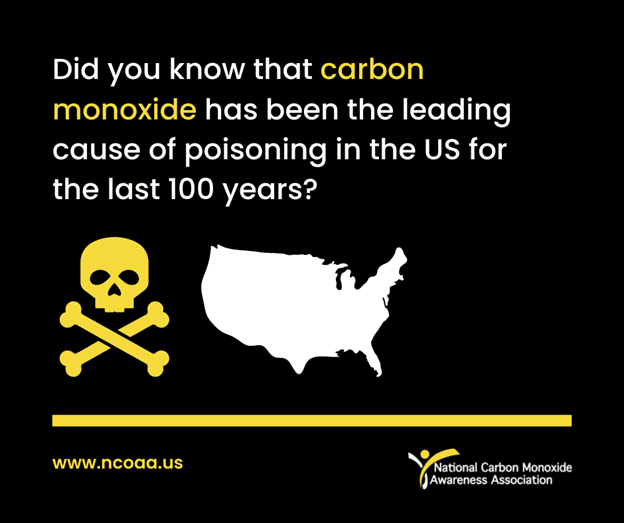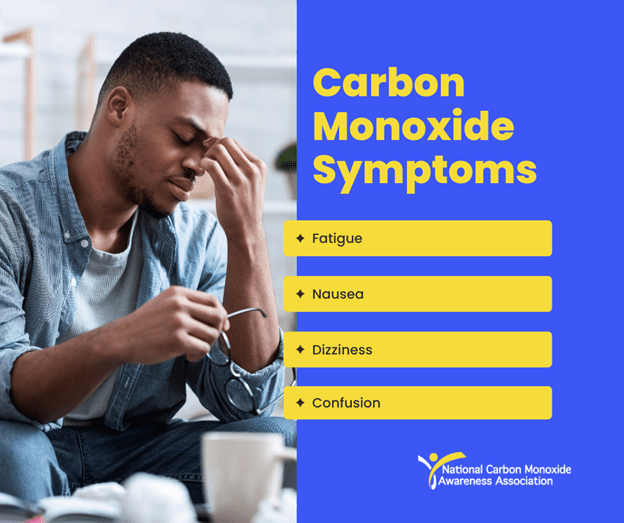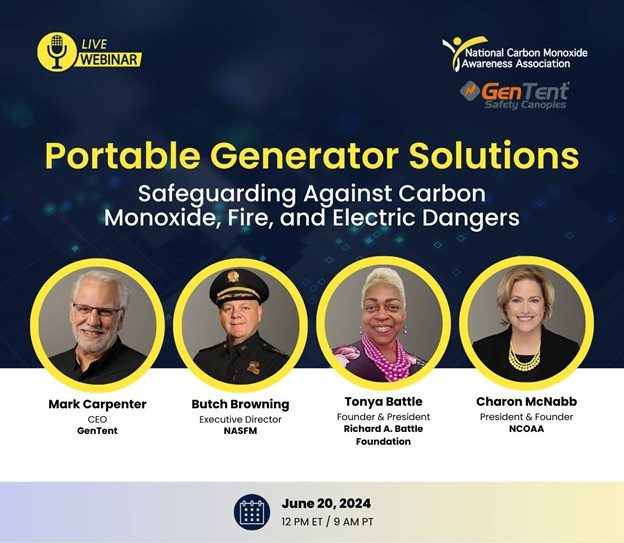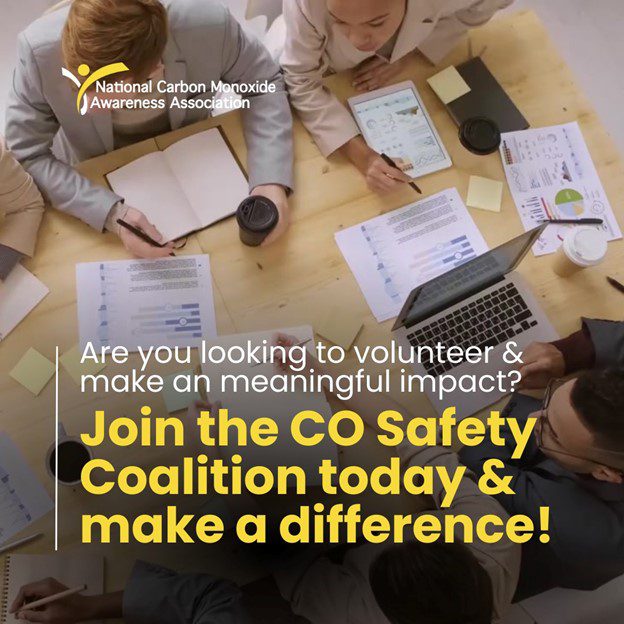Improving Indoor Air Quality—Community Spotlight
National Carbon Monoxide Awareness Association
What are some unique and innovative programs or services offered by your organization? Or: Tell us about a current project that excites you. Or: What has been a win/top accomplishment that makes you proud?
 The National Carbon Monoxide Awareness Association (NCOAA) is a nonpartisan, grassroots organization committed to eradicating carbon monoxide (CO) poisoning and supporting survivors in achieving healthier, more productive lives. Our mission is to drive a comprehensive conversation on both acute and chronic CO poisoning as a public health crisis, aiming to eliminate CO-related injuries and fatalities. One of our proudest achievements is our establishment of the international Carbon Monoxide Safety Coalition, which unites experts across fields to tackle CO safety through collaborative workgroups. These groups focus on key areas, such as emergency and trade response, data surveillance, and codes, standards, and regulations. A medical advisory group is set to debut in 2025, enhancing our efforts to address health aspects of CO exposure.
The National Carbon Monoxide Awareness Association (NCOAA) is a nonpartisan, grassroots organization committed to eradicating carbon monoxide (CO) poisoning and supporting survivors in achieving healthier, more productive lives. Our mission is to drive a comprehensive conversation on both acute and chronic CO poisoning as a public health crisis, aiming to eliminate CO-related injuries and fatalities. One of our proudest achievements is our establishment of the international Carbon Monoxide Safety Coalition, which unites experts across fields to tackle CO safety through collaborative workgroups. These groups focus on key areas, such as emergency and trade response, data surveillance, and codes, standards, and regulations. A medical advisory group is set to debut in 2025, enhancing our efforts to address health aspects of CO exposure.
A significant highlight of our work is the 2nd Annual CO Safety Summit, held in partnership with the National Association of State Fire Marshals in July 2024. Over 70 CO experts and advocates joined more than 300 fire service professionals in Kansas City, Missouri, for a robust discussion on CO safety in various environments, from homes to public spaces. This event allowed professionals to collaborate on advancing CO prevention through education, appliance standards, data analysis, and improved CO alarms. As part of our advocacy, NCOAA and our partners have submitted over a dozen proposals to the International Code Council (ICC) and the National Fire Protection Association (NFPA), aiming to include CO detection requirements across building types. We are thrilled that more than half of these proposals have been accepted in the first draft stage of the code update process.
How has your organization’s work made a difference for healthy housing in your community?
Carbon monoxide exposure within homes arises mainly from combustion devices, such as gas furnaces. While motor vehicle emissions have decreased significantly since the 1970s, indoor CO exposure remains a concern. NCOAA has actively advocated for appliance standards that prevent CO exposure, including shutoff mechanisms in portable generators, gas furnace CO monitoring systems, and gas stoves to ensure safe combustion. These targeted preventative measures can significantly reduce in-home CO exposure, promoting healthier living environments.
An essential part of our work has also been to address chronic, low-level CO poisoning—a challenge often overlooked due to its subtlety and difficulty in diagnosis. Chronic exposure can lead to serious health impacts like memory loss, neurological impairments, and heart issues. We encourage communities to use portable CO monitors capable of detecting levels as low as 0 ppm, filling the gap left by standard CO alarms that only alert users at much higher, life-threatening CO concentrations.
What is the most important thing people should know about your organization or your work?
NCOAA believes all CO poisonings are preventable. The solution requires a pragmatic, multifaceted approach due to the varying ways CO can infiltrate environments. From homes and workplaces to commercial areas and outdoor spaces, CO exposure presents unique challenges that require targeted solutions and believe the Carbon Monoxide Safety Coalition is uniquely positioned to unite experts across industries to develop the required innovative solutions. We celebrate each advancement towards the goal of eliminating CO poisonings, knowing progress is incremental and consequential.

Know your symptoms! Fatigue, nausea, dizziness, and confusion are all possible symptoms of CO poisoning.
What do you think is the most pressing challenge facing your organization and/or the community you serve?
The biggest challenge we face is the invisibility of carbon monoxide—both literally and figuratively. CO is undetectable by human senses and often mimics flu-like symptoms when exposure occurs, leading to underdiagnoses and underreporting. The CDC estimates for CO-related emergency visits have quadrupled in the past decade, but actual incidents are likely much higher. The lack of comprehensive data on CO exposure impacts how communities, policymakers, and industries perceive the need for CO protections, making advocacy efforts an ongoing challenge.
Is there an opportunity on the horizon that you believe will have a positive impact on your work?
An exciting opportunity is the Consumer Product Safety Commission (CPSC) grant program, funded by the Nicholas and Zachary Burt Memorial Carbon Monoxide Poisoning Prevention Act. This program provides grants to local, state, and tribal governments for CO alarm installations, CO education, and safety training. NCOAA has been instrumental in spreading awareness about this grant, hosting a webinar for potential applicants and inviting successful grantees to our CO Safety Summit to share best practices. We see this program as a catalyst for expanding CO safety efforts across communities and look forward to its positive impact on CO alarm usage and increased public education and awareness.
What do you value most about your partnership with NCHH and others in the healthy housing space?
The partnership with the National Center for Healthy Housing (NCHH) has been invaluable to NCOAA’s mission. Through NCHH’s technical assistance and coaching experience, we have been able to extend our reach far beyond our fiscal capacity, making significant inroads in new industries, like HVAC. The guidance on capacity building has helped grow the Carbon Monoxide Safety Coalition to over 200 members—amplifying our impact. Moreover, NCHH has provided expertise in organizing a group of CO researchers to define the prevalence of CO poisoning in the U.S., enhancing our ability to address data gaps in CO exposure.
How did being a part of the NCHH TA experience support and advance your work?
The NCHH TA experience has provided NCOAA with strategic guidance, allowing us to connect with diverse stakeholders and broaden our advocacy. NCHH’s expert-led groups have significantly advanced our understanding and outreach regarding CO’s impact on public health, making our programs more effective and inclusive.
What is the most important lesson or piece of advice you would share with others doing this kind of work?
The greatest piece of advice that has shaped NCOAA’s work is “Perfect is the enemy of progress.” Striving for perfection can be paralyzing, but accepting and celebrating incremental progress fosters meaningful change over time. Even small wins contribute to long-term success, and each step taken brings us closer to our vision of ending carbon monoxide poisoning.
Latest page update: October 2, 2024.


